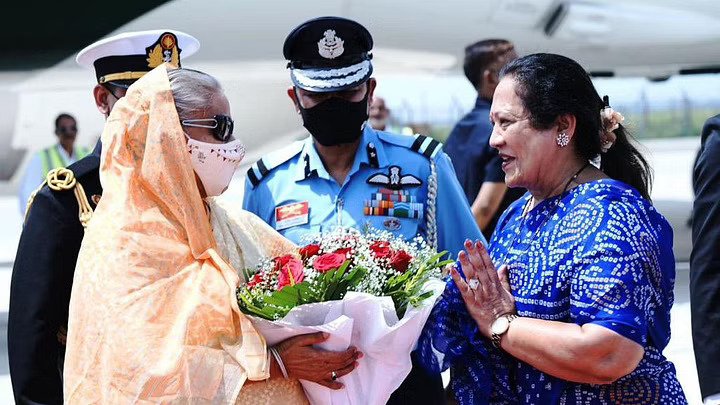India missed an opportunity to consolidate its relations with its most steady and trusted neighbour, Bangladesh, when its Prime Minister Sheikh Hasina visited Delhi for four days last week. The foreign services establishment could have killed two birds with one stone. It could have drawn Hasina even closer by helping her face the Bangladesh electorate in the elections next year with much more confidence showing really tangible results of her engagement with India silencing her critics. At the same time it could have needled China’s efforts to bring Bangladesh further within its orbit by taking up the thorny issue of the Rohingya Moslems evicted from Myanmar.
The net result of the visit is the signing of seven Memorandums of Understanding (MoUs). These are relating to cooperation in the areas of river water sharing, space, science and technology, broadcasting, and capacity building among railway and judicial personnel of the two countries. The most important of these pacts is the finalisation of an interim bilateral agreement on the withdrawal of water from the common border river, the Kushiyara. Water sharing is an important item on the agenda of the India-Bangladesh relationship as the two countries share 54 trans-boundary rivers. The agreement reached on the Kushiyara is the first that the two neighbours have signed in 25 years.
But Hasina’s trip to Delhi has in the main proved to be disappointing. The agreements that were signed could have been inked at the administrative level and no Prime Ministerial-level engagements were needed. Hasina desperately needed a treaty for sharing the waters of the river Teesta, hanging fire for an agonisingly long time.
The waters from this river are so important for agriculture and commerce for people in Bangladesh that a success in this deal would have put Hasina in a tremendously advantageous position in the coming elections and anti-India forces would have been kept at bay. The text of a pact relating to this, which gives India the right to 42.5 per cent of the river’s water and Bangladesh the right to 37.5 per cent, was prepared over a decade back. An agreement was to be signed in September 2011 during the visit of then Indian Prime Minister Manmohan Singh to Dhaka. However, India pulled out. It was not without cause that an anxious Hasina reminded her hosts of concluding a treaty on the Teesta “at an early date.” She could not do more than that and the initiative should have come from India. Failure to do so would only strengthen the hands of communal and anti-Indian forces in Bangladesh, too eager to take on Hasina.
The agreement on sharing the water of Kushiyara is much smaller in scale compared to the volume of water from the Teesta. The Centre could clinch the Kushiyara deal because it could make Assam and other north-eastern states amenable to it. But, the Teesta agreement of 2011 has been held up by West Bengal with its Chief Minister Mamata Banerjee refusing to oblige either the Centre or Hasina despite the latter’s forceful and impassioned plea to finalise it.
Ironically, the two Prime Ministers spoke on connectivity during their talks in Delhi, but connectivity did not figure among the MoUs signed. Moreover, there were several other important issues that needed to have been ironed out during the Prime Minister-level discussions. But, they were sidestepped. One of these is the killing of Bangladeshi nationals by Indian border guards. Bangladesh’s Home Minister informed parliament that 294 Bangladeshis had been killed by India’s Border Security Force (BSF) in the last decade. This is an emotive issue in Bangladesh.
However, the most ticklish issue is the fate of the Rohingya refugees. Bangladesh is taking care of over a million refugees which causes a strain on its resources. By helping Bangladesh over the settlement of the Rohingya refugees, India could have won the hearts of Bangladesh, while cornering China which is hand in glove with the autocratic military rulers of Myanmar.
China is a strategic partner of Bangladesh and Dhaka’s biggest trade partner. At a time when Bangladesh’s economy is shrinking, as is reflected in its depleting forex reserves, Dhaka needs Chinese support as well. India should have shown more boldness by conceding Hasina’s demands, including export of oil which India is getting from Russia, to its own advantage.
This can be termed as another major failure of India’s diplomatic manoeuvring and has possibly demoralized the last neighbouring country that was seen as cooperative and friendly to India.
